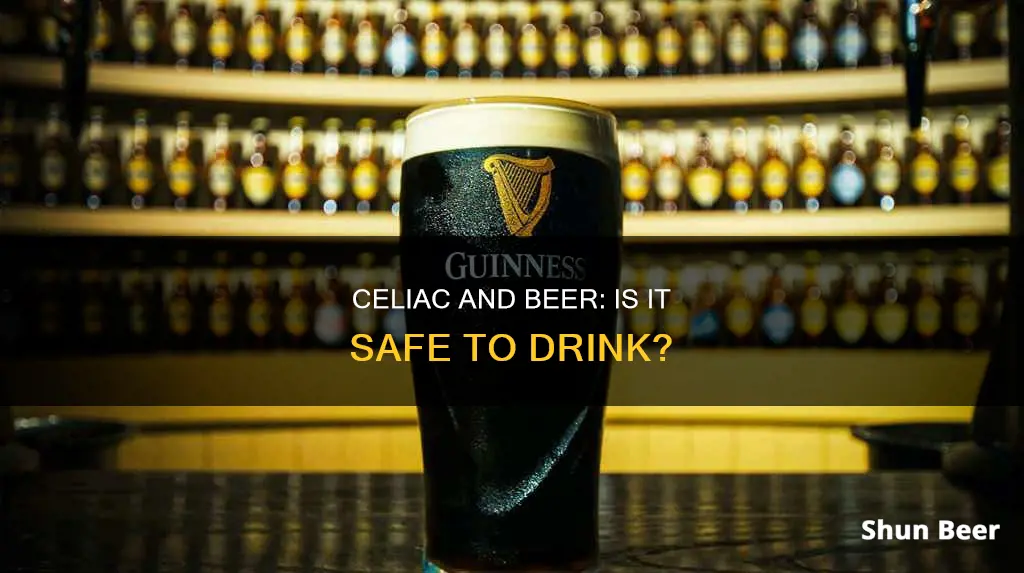
Celiac disease is an autoimmune disorder that affects the small intestine's ability to absorb nutrients. It is triggered by the ingestion of gluten, a protein found in wheat, barley, and rye. As a result, those with celiac disease must maintain a strict gluten-free diet. Beer is traditionally made with barley, hops, yeast, and sometimes wheat, which means it contains gluten. So, can a person with celiac disease drink beer?
What You'll Learn

What is Celiac Disease?
Celiac disease is a chronic long-term autoimmune disease that affects genetically predisposed people. When people with celiac disease ingest gluten, their bodies respond with an immune reaction that attacks the small intestine, causing damage to the villi, small finger-like projections that line the small intestine and promote nutrient absorption. This damage results in the body's inability to properly absorb essential vitamins, minerals, and other nutrients from food.
The exact cause of celiac disease is not known, but it is believed to occur only in people with specific genes who also consume gluten. Celiac disease is hereditary, and those with a first-degree relative affected by the disease have a 1 in 10 risk of developing it themselves. It can develop at any age after people start consuming gluten.
The symptoms of celiac disease vary from person to person, and some people may not notice any symptoms at all. Some common symptoms include digestive issues such as bloating, chronic diarrhea, abdominal pain, and weight loss, as well as other issues like depression, anxiety, dermatitis herpetiformis (an itchy skin rash), and canker sores or dry mouth.
If left untreated, celiac disease can lead to serious health problems, including malnutrition, coronary artery disease, small bowel cancers, type 1 diabetes, multiple sclerosis, dermatitis herpetiformis, anemia, osteoporosis, infertility, neurological conditions, and intestinal cancers. The treatment for celiac disease is a strict lifelong adherence to a gluten-free diet, avoiding foods containing wheat, rye, and barley.
Toby Keith's Beer Drinking: A Country Legend's Favorite Beverage
You may want to see also

What is gluten and why do people with Celiacs need to avoid it?
Celiac disease, also known as coeliac disease, celiac sprue, non-tropical sprue, or gluten-sensitive enteropathy, is a serious autoimmune disease that affects genetically predisposed people. When people with celiac disease consume gluten, their bodies respond by attacking the small intestine. This immune response causes damage to the villi, small finger-like projections that line the small intestine and promote nutrient absorption. As a result, the body is unable to absorb nutrients properly.
Gluten is a type of protein found in wheat, barley, and rye. It is commonly found in staple foods such as bread, pasta, baked goods, and cereals. Gluten is also often added to processed foods, including sauces, soups, and packaged foods. Beer is traditionally made with barley, hops, yeast, and sometimes wheat, which makes it a gluten-containing beverage.
For people with celiac disease, ingesting gluten leads to damage in the small intestine. The immune system attacks the gluten molecules, and this response causes inflammation and erosion of the mucous membrane (mucosa) lining the small intestine. This damage impairs the intestine's ability to absorb nutrients, leading to nutritional deficiencies and potentially causing malnutrition.
The only treatment for celiac disease is a strict lifelong gluten-free diet. People with celiac disease must avoid foods containing wheat, rye, and barley, which includes bread and beer. Even small amounts of gluten, such as crumbs or cross-contamination, can trigger small intestine damage. Therefore, it is essential for individuals with celiac disease to be vigilant about their gluten intake and carefully read labels to ensure they are not consuming gluten.
Prednisone and Beer: Is It Safe to Mix?
You may want to see also

What are the symptoms of drinking beer with Celiac Disease?
Celiac disease is an autoimmune disorder that affects the small intestine when a person consumes gluten. The condition causes the body to trigger inflammation in the small intestine, damaging its lining over time and reducing the absorption of nutrients.
Traditional beer is made using barley, hops, yeast, and sometimes wheat. As barley and wheat contain gluten, traditional beer is not gluten-free and can trigger symptoms in people with celiac disease.
Symptoms of drinking beer with celiac disease include:
- Indigestion
- Diarrhea
- Anaemia
- Osteoporosis
- Mineral and vitamin deficiencies
- Pancreatic insufficiency
- Gall bladder malfunction
- Intestinal lymphoma
- Certain neurological diseases
People with celiac disease can, however, consume gluten-free beer, which is made using gluten-free grains like sorghum, rice, or millet.
Beer and Diabetes: Is Corona Beer Safe for Diabetics?
You may want to see also

What are some gluten-free alcoholic drinks?
People with coeliac disease must follow a gluten-free diet. Gluten is a type of protein found in wheat, barley, and rye, and it can cause inflammation in the small intestine, damaging its lining over time and causing it to absorb fewer nutrients.
While beer is traditionally made with barley, hops, yeast, and sometimes wheat, there are now gluten-free options available. These beers are made with grains that don't contain gluten, such as sorghum, rice, or millet. Some examples of gluten-free beers include:
- Buck Wild Pale Ale by Alpenglow Beer Company
- Copperhead Copper Ale by Alt Brew
- Redbridge Lager by Anheuser-Busch
- Pyro American Pale Ale by Burning Brothers Brewing
- G-Free (Pilsner) by St. Peter’s Brewery
However, it's important to note that "gluten-removed" or "gluten-reduced" beers may not be safe for people with coeliac disease, as they are made with gluten-containing grains and may still contain traces of gluten.
In addition to gluten-free beers, there are several other types of alcoholic drinks that are gluten-free:
- Wine: All wine is gluten-free, including red, white, rosé, sparkling wines, and fortified wines like vermouth, port, and sherry.
- Distilled spirits: These are gluten-free even if made from gluten-containing grains, as the distillation process removes the gluten protein. Examples include brandy, rum, tequila, vodka, gin, and whiskey.
- Hard ciders: These are often gluten-free, but it's important to read labels carefully as some may contain barley. Examples of gluten-free ciders include Angry Orchard, Ciderboys, and Ace Cider.
- Liqueurs: These are generally gluten-free, but it's important to check the labels to ensure no gluten-containing ingredients have been added. Examples of gluten-free liqueurs include Chartreuse, Cointreau, and Sambuca.
- Mixed drinks: When made with gluten-free ingredients, mixed drinks can be a good option. Simple combinations like a gin and tonic or a martini made with potato-based vodka are safe choices.
Drinking NA Beer While on Plavix: What You Need to Know
You may want to see also

What are some gluten-free beers?
People with celiac disease or gluten intolerance have to be careful to avoid gluten, which is a protein found in wheat, rye, and barley. Traditional beers contain gluten in the form of wheat or barley, so they are not gluten-free. However, there are now several gluten-free beer options available that are made using gluten-free grains like sorghum, rice, or millet.
- Buck Wild Pale Ale by Alpenglow Beer Company (California, USA)
- Copperhead Copper Ale by Alt Brew (Wisconsin, USA)
- Redbridge Lager by Anheuser-Busch (Missouri, USA)
- Felix Pilsner by Bierly Brewing (Oregon, USA)
- Pyro American Pale Ale by Burning Brothers Brewing (Minnesota, USA)
- Third Contact IPA by Divine Science Brewing (California, USA)
- Glutenator IPA by Epic Brewing Company (Utah, USA)
- Celia Saison by Ipswich Ale Brewery (Massachusetts, USA)
- English Pale Ale by Autumn Brewing Company (Seaham, UK)
- G-Free (Pilsner) by St. Peter’s Brewery (Bungay, UK)
- Forager Amber Pale Ale by Whistler Brewing Company (British Columbia, Canada)
- Massager Millet Lager by Microbrasserie Nouvelle France (Quebec, Canada)
- Gluten-Free Pale Ale by Scott’s Brewing Company (Oamaru, New Zealand)
- Pale Ale by Wild Polly Brewing Co. (Western Australia, Australia)
- Ghostfish Brewing Company Grapefruit IPA (Seattle, USA)
- Buckwit Belgian by Holidaily Brewing Company (Golden, Colorado, USA)
- Vanishing Point Pale Ale by Ghostfish Brewing Company (Seattle, USA)
- Meteor Shower Blonde Ale by Ghostfish Brewing Company (Seattle, USA)
- Shrouded Summit Belgian White Ale by Ghostfish Brewing Company (Seattle, USA)
- Lunar Harvest Pumpkin Ale by Ghostfish Brewing Company (Seattle, USA)
- Ground Breaker Brewing Dark Ale (Portland, Oregon, USA)
- Duck Foot Brewing Company Drink This or the Bees Die (San Diego, USA)
- Stone Brewing Delicious IPA (San Diego, USA)
- Odd13 Brewing Codename: Superfan (USA)
- New Planet Beer Blonde Ale (USA)
- New Belgium Brewing Company Glütiny Pale Ale (USA)
- Two Brothers Artisan Brewing Prairie Path Golden Ale (USA)
- Omission Beer Ultimate Light Golden Ale (USA)
Please note that this list is not exhaustive, and there may be other gluten-free beers available in your region. Additionally, it is always a good idea to read the labels carefully and check the gluten content before consuming any beer.
A Student's Bizarre Behavior: Beer and Jeffrey Dahmer
You may want to see also
Frequently asked questions
Conventional beer is not gluten-free, and therefore not suitable for people with celiac disease. However, there are now many gluten-free beers on the market, which are made with grains that don't contain gluten, such as sorghum, rice, or millet.
If a person with celiac disease drinks beer made with barley, wheat, or rye, they could experience an immune reaction, with symptoms such as indigestion and diarrhoea.
Wine is naturally gluten-free, as are most liquors, such as bourbon, whiskey, tequila, and rum, which are considered gluten-free after the distillation process. Hard seltzers are also usually gluten-free, but some added flavourings may contain gluten, so it's important to check the label.
People with celiac disease should avoid beer or ale unless it is labelled "gluten-free". They should also be cautious of alcohol labelled "gluten-removed", as it may still contain fragments of gluten.







